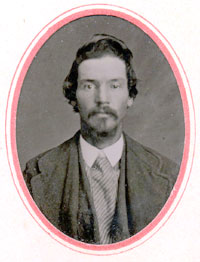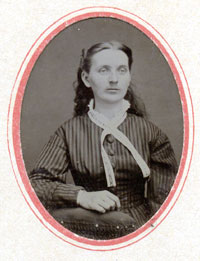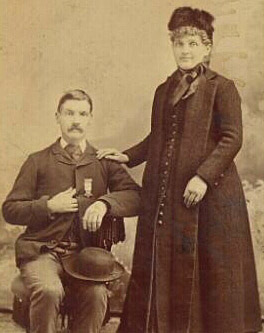
|
|
Pvt. William Henry Fross
Company K The story and photos of William Henry Fross was generously shared by his
great-great grandson, Clark O. Kidder.
William, his younger brother Stephen, and his sisters Hannah and Ann, were apprenticed to a Shaker community in Watervliet, New York at a young age. They are listed among the 82 members of "The United Society of Shakers," on the 1850 U.S. Federal Census. This was a common practice during those times, especially when children were left without a father to provide for them. Records at the Shaker Heritage Museum, 875 Watervliet Shaker Rd., Albany, NY, give us the following information:
"Fross, William - Returned to the world on January 1, 1855 (See Journal 328 or 378). Fross, Ann and Hannah - Returned to the world in 1853; came back to the Shaker community February 1855, and lived with the west family (families were divided into North, South, East, and West)." Elizabeth Beach Peabody, a granddaughter of William's brother, Stephen Fross, wrote a book titled "Grandma and How She Grew," 1989, printed by The Catholic Printery, in which the above Shaker community is described: "The Shakers of Niskyuna - Grandpa Fross' mother was left a widow with several small children. The Shakers took Steven Fross to bring up, so he never went to school very much. They only taught the children a little reading and such, so they could read their Bibles. They believed in teaching children to do things that they could earn a living with. They were wonderful farmers, good cooks and housekeepers. When Grandpa Fross grew up, he didn't stay with the Shakers any more. He left and went to work in Troy, New York. After he married Grandma, she taught him quite a lot about arithmetic and whatever she knew that he didn't. For twenty or thirty years, Grandpa was floor manager at Quackenbush's store. I was about three then Mama took us children down to Troy. Of course, Grandpa Fross took us all out to the Shakers. Mama and Aunt Fanny used to go out regularly when they were growing up. A number of young girls in their teens were living there. I suppose because I was sort of a baby, they all went for me in a big way. It frightened me, and I went and hid under Aunt Harriet's apron. She was the big, old colored woman in charge of the kitchen. At that time, the Head Sister in the village was Sister Rachael. The Head Man who directed the work on the farm and the men's activities was Brother Isaac Anstaat. He was Dutch. I can see him, just as plain. He was a short, square man, with a square face, and really blue eyes. The men wore ordinary dark clothes. The women wore a mouse colored material that was made with a plain bodice and a full skirt. They had a wide collar, or bertha, of the same material around their shoulders. For church, they wore a big bonnet, which is still called a Shaker Bonnet; sort of a scoop shape, which covered their hair all up. It was sort of shaped like a sunbonnet, but of straw, not material." At church, the women went in one door at one side, the men at another door and sat on the other side of the church. I don't believe we stayed over night, but I remember a big dinner, and going to church. I thought it was so queer that when they sang, everyone got up and marched around the church, shaking their hands up and down, to shake off sin. Their hymns were usually of a marching tempo and had few verses. They sang each verse over several times before they went on to the next. Grandpa Fross used to sing one of the hymns to us. The Shakers used to have very bountiful meals. They would urge you to eat everything you could possibly, but once you refused a second helping, it wasn't pressed on you again. They thought people knew their own needs and wishes. Uncle Fred Hamilton and Emilia Cox, who was his cousin, used to ride out there from Troy on their bicycles. They were always asked to stay to dinner. Emilia has told about the time there was celery for dinner. She was not very fond of celery, but Uncle Fred told her she had to eat everything that was offered. He urged her to take plenty. When she had eaten all she could, she tucked the rest under the edge of her plate. Uncle Fred saw it and whispered to her, 'Eat it up. They'll be mad.' He made her eat it all, the leaves and all. She never forgave him. It was called the Niskyuna Settlement, and was between Watervliet and Schenectady. The Shakers tried to be self-sufficient. They made whatever they could for their own use. They made furniture, raised cattle, made butter and sold it, and cheese. The little tin lunch pails we carried to school had 'Isaac Anstaat' in raised letters on the covers. They were used to pack butter in to sell. I suppose Grandpa Fross had got them out there. The Shakers didn't believe in marriage. They were all Brothers and Sisters in the Church. They often took young boys and girls to raise, but they were under no compulsion to stay after they grew up, unless they wanted to. Gradually the community died out. The place was all subdivided and sold, but the land was so rich and well-kept that it is still very fertile. One lady who lives there now told me that she had the most beautiful raspberries in her garden, from the old original stock that the Shakers had had there." She included the following recipe:
Sweetened Mashed Berries Thin-sliced Bread Line pan with foil. Fill, layering bread and berries. Cover with waxed paper and cardboard cut to fit. Weight evenly for 8 hours. Invert to serve, and top with whipped cream and more berries." According to various sources, William resided in Seymour, Outgamie County, Wisconsin, DePere, Brown County, Wisconsin, then Lima, Rock County, Wisconsin, then Milton Junction and Milton, Rock County, Wisconsin. William answered Abraham Lincoln's call for troops to defend the Union, and enlisted as a Private in Capt. Ira Morton's Company K of the 28th Wisconsin Volunteer Infantry. Morton died of disease in 1863 at Little Rock, and Levi Bilings took over as Captain. He served in that capacity until December 30, 1864 when he was discharged for disability. In February 1865, Lt. George F. Cowing was promoted from 1st Lt. to Captain of Co. K. William was 25 years old when he enlisted. He did so in Bradford, Rock County, Wisconsin on August 21, 1862 for three years. He was Mustered-out at Brownsville, Texas on August 23, 1865. He took part in the Battle of Helena, Arkansas. His regiment history, supplied by the Wisconsin Veteran's Museum, is as follows:
Officers Died of Disease or Accident: 6 Enlisted Killed or Mortally Wounded: 12 Enlisted Died of Disease or Accident: 221 Battles Fought:
"The Twenty-eighth regiment of Infantry was organized at Camp Washburn, Milwaukee, WI, and finally mustered into service on September 13, 1862. It left the State December 20, 1862, proceeded to Columbus, Kentucky, and was assigned to service. In January, 1863, it took part in the expedition up the White River into Arkansas. In the February following it was assigned to and accompanied the forces engaged in the Yazoo Pass, MS, expedition, February 24 - April 8, 1863. After the return from this field of operations the regiment was assigned to service in Eastern Arkansas in the vicinity of Helena or Pine Bluff, and engaged in garrison and almost constant fatigue duty with and on an occasional expedition in different directions. In these various campaigns participating in many minor actions. Was a part of the force engaged in the defense of Helena, AR, July 4, 1863. In March, 1865, it accompanied the forces and participated in the Mobile Campaign March 17 - May 3, 1865, took part in the siege of Spanish Fort. Thereafter the Twenty-eighth was sent to Texas, arriving at Brazos Santiago on the 6 of June, and camped in the vicinity of the mouth of the Rio Grande river doing guard and fatigue duty until the 23rd of August, 1865, when the regiment was mustered out of the service of the United Sates. Returning to Madison, Wisconsin it was disbanded on the 23rd of September, 1865."
In 1892, William applied for an Invalid Pension (No. 477,603). Various members of the community signed affidavits stating that William suffered from a variety of maladies, including: "sick headaches, disease of the stomach, rheumatism, heart disease, injury to right eye, disease of spine and kidneys (W. W. and W. P. Clarke, retail druggists); sick headache, rheumatism, and dizzy spells (Charles H. Fuller, fellow worker); Hart (sic) difficulty (Frank H. Gifford, fellow worker); head ache (sic), due to heart trouble (A. O. Gifford, fellow worker). William received Invalid Pension No. 913679, applied for on June 10, 1907 (his 70th birthday), and allowed for by an Act dated February 6, 1907. He was paid $72.00 per month until his death. In August 1922, William applied for an increase in pension. An affidavit was supplied, signed by G. E. Crosley, M. D., of Milton, Rock County, Wisconsin. It read as follows: "As attending physician I have had occasion to see William H. Fross at intervals. That during the winter of 1921-22 he suffered from lumbogr and rheumatism to such an extent that much of the time he was unable to be about and had to be cared for by his wife. At the present time he is confined to the bed a part of the time with a detilation? of the heart with accompanying dyspnorce? and pain on exertion and as a consequence requires much care. Senile changes with arterio sclerosis are doubtless an increasing factor in his condition. His wife is also in poor health, having undergone a severe operation several years ago and has been very nervous since that time. G. E. Crosley, M. D." On the 1885 Wisconsin veteran's census, his post office is Milton Junction, Rock County, Wisconsin. In 1895 and 1905, his post office is in Milton, Rock County, Wisconsin.
William and Roseltha lived in the first house west of the meat market on College Street, in Milton, Rock County, Wisconsin. William is remembered as a very neat man by his Kidder grandchildren. He built a board walk from the back door of his kitchen, out to the outhouse. He and Roseltha kept a pet parrot. The only swear word his granddaughter Helen Kidder ever heard him say was "shit," and that was when he cut his hand while sawing wood. William and Roseltha Fross joined the First Congregational Church in Milton, Wisconsin in 1908, where William was later appointed "deacon for life." The following extracts are taken from the church records: September 5, 1908 . . . "presented letters of recommendation . . . and Mrs. Rosa Fross from the M. E. church of Milton, and by vote were received into membership of this church. Mrs. Lucy C. Smith and Wm H. Fross offered themselves as candidates on their confession of faith, and were examined by the pastoral committee, and approved by them." September 6, 1908 . . . "Before the morning services, the following named persons presented themselves for membership of the church and were examined by the pastoral committee and approved by them . . . by vote of the church, Wm H. Fross . . . were received into membership on confession of faith." March 9, 1912 . . . "on ballot William Fross was elected Deacon." January 3, 1912 . . . "Mr. Wm Fross was re-elected Deacon." January 2, 1915 . . . ". . . and W. H. Fross were appointed tellers." January 5, 1918 . . . ". . . proceeded to ballot for deacon in place of H. Wh. Fross whose term of office had expired . . . the vote for Deacon resulted in the election of Mr. Fross to succeed himself." January 3, 1920 . . . "The ballot for Deacon in the place of W. H. Fross resulted in the election of Mr. Fross to succeed himself. Mr. Betts suggested that as Mr. Tracy was absent and Mr. Fross and himself were not so young as they were once, that we elect another Deacon . . ." Financial Report for 1919 . . . "To W. H. Fross for 2 weeks janitor work and work at church in November $6.25" January 3, 1923 (Annual Meeting) . . . "Ballots were prepared for election of Mr. Fross to succeed himself as deacon. He was unanimously elected by the church as honorary deacon for life." 1923 Annual Report . . . "Deaths - April 30 - William H. Fross" William's obituary reads: "William H. Fross, one of Milton's older citizens, died at his late home May 22, 1923. He was born in Waterford, New York, his birthday being June 10, 1837. When he was fourteen years old he was apprenticed to the Shakers, a community group located not far from his home. He served for seven years and became proficient in carpentry and broom making. Sometime after he was 21 he came to Wisconsin. When Lincoln called for troops to defend and preserve the Union, Mr. Fross enlisted at Bradford, becoming a volunteer in the 28th Wisconsin. He served throughout the war and at its close was honorably discharged. He was a charter member of the A. D. Hamilton Post No. 60, G. A. R. His death reduces the number of living charter members to two, Comrades E. F. Wieglef and George W. Lanphere.
Mr. Fross was a professing Christian who loved the house of worship and the activities of the Chrisian life. He was a member of the local Congregational church and an honored deacon. His kind, cheery, happy disposition and genial approach to men won for him many close friends. His purpose to live the square life won the approbation of his acquaintances. He is survived by his wife and two daughters. He had no near relatives living excepting two nieces and a nephew. The American Legion had charge of the services and assisted the members of the G. A. R. at the burial in Milton cemetery. Rev. Henry N. Jordan conducted the devotional services at the house. The legion quartet sang two hymns as a part of the service. Those from away who were present at the funeral of the late W. H. Fross were Mr. and Mrs. Will Ritchie, Ashland, and their son Russel of the University of Madison, Mrs. Frank Murray, Beloit, Mrs. U. G. Millar, Mrs. Charles Millar, Edgerton, Mrs. William Truman, Miss Effie Truman and her brother Harry, and Fred Truman, Lima Center." | ||||||||
|
Webmaster: | ||||||||
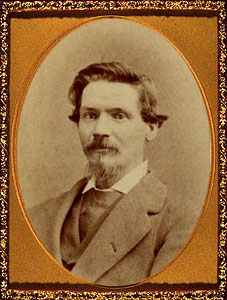
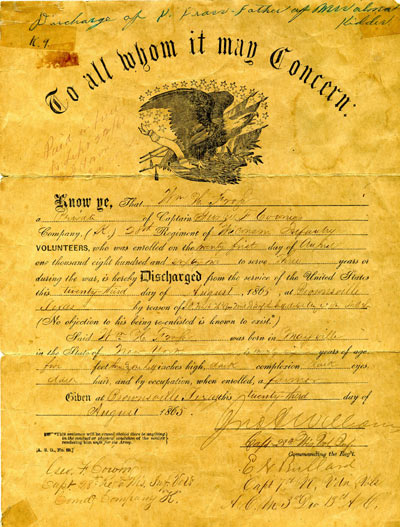 William H. Fross' original discharge papers are at the Milton Historical Society in Milton, Wisconsin. They state that at age 26, William stood 5' 3 1/2" high, had a dark complexion, dark eyes, dark hair, and was by occupation a farmer. On William's declaration for a pension, dated June 10, 1912, William states that his places of residence were: "Milton Jct., Wis 3 ys - Fort Howard Wis - 3ys - Lima, Wis - 8 yrs, Milton, Wis, 33 years."
William H. Fross' original discharge papers are at the Milton Historical Society in Milton, Wisconsin. They state that at age 26, William stood 5' 3 1/2" high, had a dark complexion, dark eyes, dark hair, and was by occupation a farmer. On William's declaration for a pension, dated June 10, 1912, William states that his places of residence were: "Milton Jct., Wis 3 ys - Fort Howard Wis - 3ys - Lima, Wis - 8 yrs, Milton, Wis, 33 years."